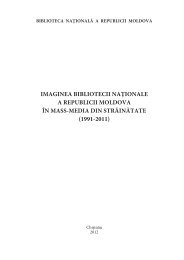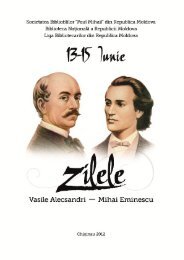POLITICĂChampion, Marc. In Moldovan Vote, It’s East vs.West / Marc Champion // The Wall street Journal. – 2009.– 29 July. – P. A9.Pe paginile ziarului american The Wall Street Journala fost publicat articolul lui Marc Champion In MoldovanVote, It’s East vs. West, în care este pusă în discuţieproblema alegerilor din Republica Moldova, în deosebialegerile parlamentare repetate din data de 29.07.09. Autorularticolului presupune calea pe care îl va alege RepublicaMoldova pentru următorii ani: comunismul saudemocraţia.Cititorul va putea lectura integral articolul în Almanahulnostru, aprecierile, concluziile, aşa cum au fost sesizatede autor:“Moldovans repeating national elections on Wednesdayface stark choice: vote for the ruling Communist Partyand receive loans from their Chinese and Russian backersworth well over a third of national income, or put theirfaith in the West.The outcome of the vote is too close to call, according toopinion polls and political analysts, though few expect arepeat of the riots and brutal police crackdown that followedApril’s turbulent elections that were tainted by fraudallegations.Those elections and Wednesday’s vote are having an impactwell beyond the borders of this small ex-Soviet nationof four million, stoking a fierce geopolitical competitionfor its loyalties. Vladimir Voronin, Moldova’s outgoingpresident and likely speaker of the next parliament, turnedsharply east after April’s events, when anticommunistprotesters stormed his office and the parliament building.He accused neighboring Romania of provoking the riots inan attempted a coup d’état and angrily rejected EuropeanUnion criticism of his handling of the election aftermath,in which hundreds of opposition supporters were jailed,and two people died.Mr.Voronin, a former baker and Soviet-era interior minister,traveling to Moscow in June, got a warm welcomeand a pledge of $500 million in loans for infrastructureprojects in Moldova. It wasn’t revealed what conditionswere attached to the loan, and it isn’t clear whether theoffer would remain if the communists were to lose theirgrip on power.That presents Moldovans with the prospect that votingagainst the communists could mean relying instead on theWest, specifically the International Monetary Fund, tohelp lift up the country’s economy.On Monday, Mr.Voronin denied accusations that themoney came with a political price attached, in an interviewwitch a political price attached, in an interview withRussian news agency Interfax. He said Moscow had madeno conditions, “unlike certain international organizations”.He didn’t specify which organizations he meant.Last week, China also put its substantial resources behindMr.Voronin, when China Overseas EngineeringGroup Co. signed a memorandum of understanding for$1 billion in loans for infrastructure projects.The two pledges are equal to 37% of Moldova’s $4 billionannual gross domestic product and dwarf the amountof money on offer from Western institutions such as theIMF.The EU hasn’t tried to match the Russian and Chineseloan offers. But it has sent a string of officials to encourageclean elections, including last week’s visit by Poland’s ForeignMinister Radek Sikorski, a big proponent of EU expansioninto the region. An IMF official in Moldova saida mission was expected to arrive in Chisinau to negotiate anew loan facility as soon as a new government is formed.China’s interest in Moldova, a small and distant countrywith few natural resources, has baffled some diplomatsin the capital, Chisinau. But they note that China has longhad close relationship with Mr.Voronin’s government,one of the last in Europe to call itself communist.ChinaOverseas Engineering Group didn’t return calls itself communist.China Overseas Engineering Group didn’t return callsfor comment, and the Chinese Embassy in Chisinaucouldn’t be reached.Russia’s interest in Moldova, where its military supportsa separatist enclave of Russian speakers, is evident.Moscow is determined to protect its zone of influence inthe ex-Soviet bloc and saw April’s violent postelection streetprotests as part of “Romania’s Anschluss policy towardMoldova”, said Sergei Markov, director of the Institutefor Political Studies in Moscow, in a reference to NaziGermany’s annexation of Austria. Most of Moldova is Romanianspeaking and belonged to Romania before WorldWar II, when it was seized by the Soviet army.Mr. Markov said the two offers of loans don’t indicateany rivalry between Moscow and Beijing. “I would notbe surprised if Russia asked the Chinese to offer money,because both are interested to reverse this trend of Western-backedregime change in the region,”he said. Since2003, postelection street protests have led to changes ofgovernment in Georgia, Ukraine and Kyrgyzstan.Political analysts in Moldova say the country’s Westernleaningopposition parties are more likely to lose than gainvotes in Wednesday’s poll, which was forced not by thestreet protests but the failure of the Communists to gatherthe 61 votes needed in the 100-seat parliament to elect anew president.Some Moldovans are skeptical the Russian and Chinesemoney will materialize, whoever wins the election”.38 Imaginea Republicii Moldova în străinătate
POLITICĂGoanec, Mathilde. Moldavie: le régime rougeveut se faire réélire / MathildeGoanec // Ouest-France (Rennes). – 2009.– 31 mart. – P. 2.Periodicele străine, precum ziarele din Franţa, semnaleazădespre evenimentele politice din ţara noastră, şianume alegerile parlamentare care au avut loc în aprilie2009. În articolul pe care îl prezentăm, autoarea vorbeştedespre sistemul de guvernare, partidul aflat la puterepână la acea perioadă. Se încearcă unele pronosticuriîn vederea stabilirii opţiunii alegătorului. În general,autoarea aduce la cunoştinţa cititorului faptul că, deşicriticaţi pentru gestiunea puterii, comuniştii, aflaţi laputere timp de opt ani, sunt totuşi favoriţii în campaniaelectorală. Autoarea constată şi pentru acel moment şipentru o perioadă de perspectivă existenţa unui regimroşu la porţile unei Europe liberale.În cele ce urmează prezentăm articolul respectiv:„La Moldavie votera dimanche. Cette ex-républiquesoviétique, proche de la Roumanie, a la triste réputationd’être le pays le plus pauvre d’Europe. Pourtant, le particommuniste moldave, au pouvoir depuis 2001, pourraitbien être reconduit au Parlement.Du résultat de ce scrutin, dépendra aussi la nominationdu gouvernement et du Président, pour l’instant incarnépar le chef de file du Parti communiste, VladimirVoronine. «Selon la constitution, Voronine n´a plus ledroit d´être Président, mais il se verrait bien rester aupouvoir, dans le fauteuil du chef de l´assemblée ou dePremier ministre», affirme un diplomate étranger.«Un produit marketing»Un régime définitivement rouge, à la porte de l´Europe libérale,l´image est saugrenue. Mais pour Emilian Galaïcu,éditeur à Chisinau, «ce parti n´est pas communiste au senssoviétique du terme. C´est juste un produit marketing, quimarche bien parce qu´il y a beaucoup de nostalgiques quiveulent le retour du pain à 16 kopeks…Par contre, commesous l´URSS, il y a une très forte concentration du pouvoirdans les mains d´un seul homme». Grigory Petrenko,député communiste en campagne électorale, s´agace de cescritiques: «On nous traite de pouvoir totalitaire, staliniste…Toutcela me paraît vraiment stupide. Nous sommesun parti moderne et non dogmatique.»La faucille et le marteau, associés à un capitalisme sauvage:la recette a ses adeptes. Ekaterina et Konstantin,tous les deux retraités, vivent dans un petit village prèsde la frontière roumaine. «Le système actuel n´est pas simauvais, avance la timide Ekaterina. Nous recevons lessalaries et les pensions à l´heure et ils sont régulièrementaugmentés.»La retraite de Konstantin s´élève à 800 lei, soit près de55 €. Face à ce dénuement, la santé du «clan Voronine»fait mauvais genre: son fils, Oleg, est un richissime homed´affaires, accusé d´avoir joué de l´influence paternellepour faire main basse sur les enterprises les plus florissantesdu pays.Dans une Moldavie multi-ethnique, à la fois russe et roumaine,la chasse à l’électeur est complexe. L’opposition,qui se revendique libérale et démocrate, s’y casse lesdents. Désunie, elle peine aussi à se faire entendre, car«les communists ont le monopole sur les médias de masseet la main sur les resources administratives», remarqueSorina Stefarta, journaliste à Chisinau.Le pouvoir en place est aussi critiqué pour ne pas avoirfavorisé le vote des nombreux Moldaves partis travaillerà l’étranger, souvent illégalement, et considérés commeplutôt défavorables aux communistes. Dans un pays dequatre millions d’habitants, le silence forcé de près d’unquart des électeurs pèsera lourd sur le scrutin”.Schwirtz, Michael. VoteAppears To Unseat CommunistsIn Moldova / MichaelSchwirtz // New YorkTimes. – 2009. – 31 July. –P. A4.Ziarul american New York Times a luat în dezbatereevenimentele ce au avut loc în Moldova pe parcursulanului 2009, oglindind alegerile parlamentare, şianume, alegerile parlamentare repetate. De rezultateleacestor alegeri depindea viitorul politic, social-economic,cultural al ţării.În perioada acestor alegeri se confruntau două stiluripolitice: stilul rusesc de conducere – Partidul Comuniştilor,pe de altă parte modelul stilului bazat pe accentulpus de Uniunea Europeană cu privirte la dezvoltareademocratică profundă – partide prooccidentale de opoziţie.Locuitorii din capitală au reacţionat cu precauţie la ooarecare schimbare posibilă în guvern, având în vederemultiplele promisiuni neîmplinite în aproape două deceniide independenţă.Propunem cititorului de a lectura integral acest articolpe paginile almanahului nostru:„Chisinau, Moldova – Moldova’s pro-Western oppositionparties appear to have unseated Europe’s lastgoverning Communist Party in repeat parliamentaryelections that have become a test of whether this impoverishedformer Soviet republic will lean toward the Westor Russia.With most votes counted from Wednesday’s elections,Imaginea Republicii Moldova în străinătate 39
- Page 1 and 2: ISSN 1857-1565BIBLIOTECA NAŢIONAL
- Page 4 and 5: Grigore vieru - martir al neamului
- Page 6 and 7: Grigore vieru - martir al neamului
- Page 8 and 9: Grigore vieru - martir al neamului
- Page 10 and 11: Grigore vieru - martir al neamului
- Page 12 and 13: Grigore vieru - martir al neamului
- Page 14 and 15: Grigore vieru - martir al neamului
- Page 16 and 17: Grigore vieru - martir al neamului
- Page 18 and 19: Grigore vieru - martir al neamului
- Page 20 and 21: Grigore vieru - martir al neamului
- Page 22 and 23: Grigore vieru - martir al neamului
- Page 24 and 25: Grigore vieru - martir al neamului
- Page 26 and 27: CULTURĂ. CIVILIZAŢIEdlung oftmals
- Page 29 and 30: BIBLIOTECONOMIEственно, та
- Page 31 and 32: BIBLIOTECONOMIEOsoianu, Vera. Bibli
- Page 33 and 34: BIBLIOTECONOMIEOsoianu, Vera. Compo
- Page 35 and 36: POLITICĂGabanyi, Anneli Ute. Moldo
- Page 37: POLITICĂangesichts dieser Umfragen
- Page 41 and 42: POLITICĂ(soixante et un députés)
- Page 43 and 44: POLITICĂfamiliile lor, aceştia su
- Page 45 and 46: POLITICĂLa Moldavie recompteses bu
- Page 47 and 48: POLITICĂtes aujourd’hui pour des
- Page 49 and 50: POLITICĂBarthet, Elise. Cinqquesti
- Page 51 and 52: POLITICĂMoldavia, 193 personearres
- Page 53 and 54: medicinăСалита, Х. Запи
- Page 55 and 56: medicinăчто всегда был
- Page 57 and 58: PICTURĂmai bună conştientizare a
- Page 59 and 60: PICTURĂcipantă, fiind selecţiona
- Page 61 and 62: PICTURĂIoan Grecu - artist plastic
- Page 63 and 64: PICTURĂ2002 - Sculptura la îngem
- Page 65 and 66: PICTURĂFloarea dimineţii, s. Hru
- Page 67 and 68: PICTURĂtru Copii din Orhei, Moldov
- Page 69 and 70: PICTURÔLumina din picturile lui
- Page 71 and 72: PICTURĂION SEVERIN, un artist basa
- Page 73 and 74: MUZICĂALEXA (Olga Fesenco) a adus
- Page 75 and 76: MUZICĂmai spune că s-a simţit fo
- Page 77 and 78: MUZICĂProfesorul lui Ilian Gârne
- Page 79 and 80: MUZICĂprecizând că cei şase pre
- Page 81 and 82: MUZICĂŞTEFĂNEL ROŞCOVANTânăru
- Page 83 and 84: SPORTAi noştri pe EverestUn concet
- Page 85 and 86: SPORTsemnat pe Ion Dosca al patrule
- Page 87 and 88: SPORTDupă faza preliminară din 7
- Page 89 and 90:
LINGVISTICĂ• Membru al Comitetul
- Page 91 and 92:
LINGVISTICĂinterculturale ULIM, re
- Page 93 and 94:
Ştiinţa literaturiilum este probl
- Page 95 and 96:
Ştiinţa literaturiiantitotalitari
- Page 97 and 98:
Ştiinţa literaturiirepede morală
- Page 99 and 100:
literatura artisticăCiocan, Iulian
- Page 101 and 102:
literatura artisticăv stud a zmate
- Page 103 and 104:
literatura artisticăDruŢă, Boris
- Page 105 and 106:
literatura artisticăpoporului bibl
- Page 107 and 108:
literatura artisticăTRAIANUS. Inbo
- Page 109 and 110:
literatura artisticăTRAIANUS. Reg
- Page 111 and 112:
ArheologieТези Мiжнарод
- Page 113 and 114:
IstoriePlugaru, Ştefan. Episcopia
- Page 115 and 116:
Istorietarea ei de reşedinţele ep
- Page 117 and 118:
BIBLIOGRAFIE1. Alloquor: Studia Hum
- Page 119 and 120:
BIBLIOGRAFIEжитностi в до
















